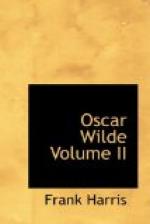“That paragraph was the outcome of a walk and talk I had one afternoon at Chartres with Robert Ross.
“You reveal Wilde as a weaker man than I thought him: I still believe that his fierce Irish pride had something to do with his refusal to run away from the trial. But in the main your evidence is conclusive. It was part of his tragedy that people asked more moral strength from him that he could bear the burden of, because they made the very common mistake—of which actors get the benefit—of regarding style as evidence of strength, just as in the case of women they are apt to regard paint as evidence of beauty. Now Wilde was so in love with style that he never realized the danger of biting off more than he could chew: in other words, of putting up more style than his matter would carry. Wise kings wear shabby clothes, and leave the gold lace to the drum major.
“You do not, unless my memory is betraying me as usual, quite recollect the order of events just before the trial. That day at the Cafe Royal, Wilde said he had come to ask you to go into the witness box next day and testify that Dorian Gray was a highly moral work. Your answer was something like this: ’For God’s sake, man, put everything on that plane out of your head. You don’t realize what is going to happen to you. It is not going to be a matter of clever talk about your books. They are going to bring up a string of witnesses that will put art and literature out of the question. Clarke will throw up his brief. He will carry the case to a certain point; and then, when he sees the avalanche coming, he will back out and leave you in the dock. What you have to do is to cross to France to-night. Leave a letter saying that you cannot face the squalor and horror of a law case; that you are an artist and unfitted for such things. Don’t stay here clutching at straws like testimonials to Dorian Gray. I tell you I know. I know what is going to happen. I know Clarke’s sort. I know what evidence they have got. You must go.’
“It was no use. Wilde was in a curious double temper. He made no pretence either of innocence or of questioning the folly of his proceedings against Queensberry. But he had an infatuate haughtiness as to the impossibility of his retreating, and as to his right to dictate your course. Douglas sat in silence, a haughty indignant silence, copying Wilde’s attitude as all Wilde’s admirers did, but quite probably influencing Wilde as you suggest, by the copy. Oscar finally rose with a mixture of impatience and his grand air, and walked out with the remark that he had now found out who were his real friends; and Douglas followed him, absurdly smaller, and imitating his walk, like a curate following an archbishop.[7] You remember it the other way about; but just consider this. Douglas was in the wretched position of having ruined Wilde merely to annoy his father, and of having attempted it so idiotically that he had




